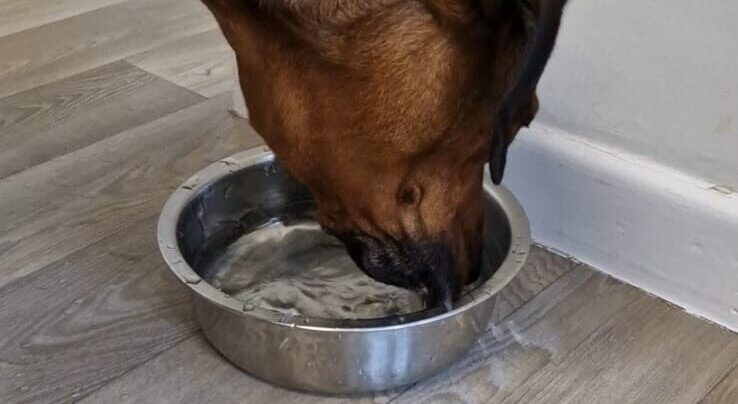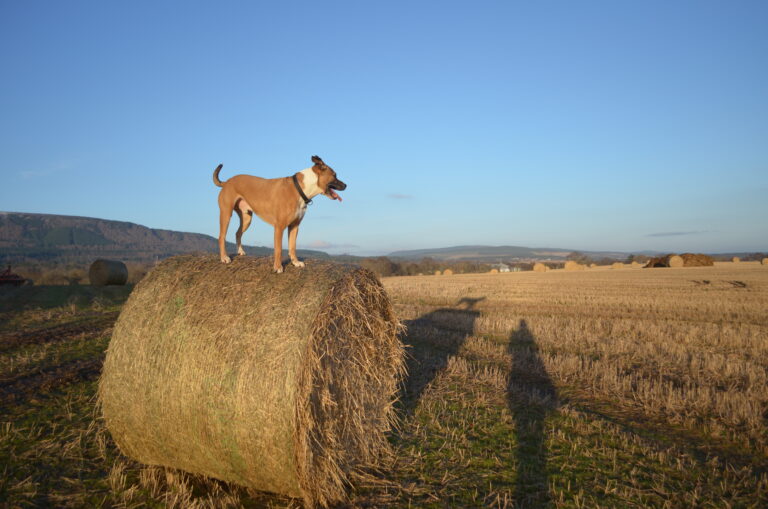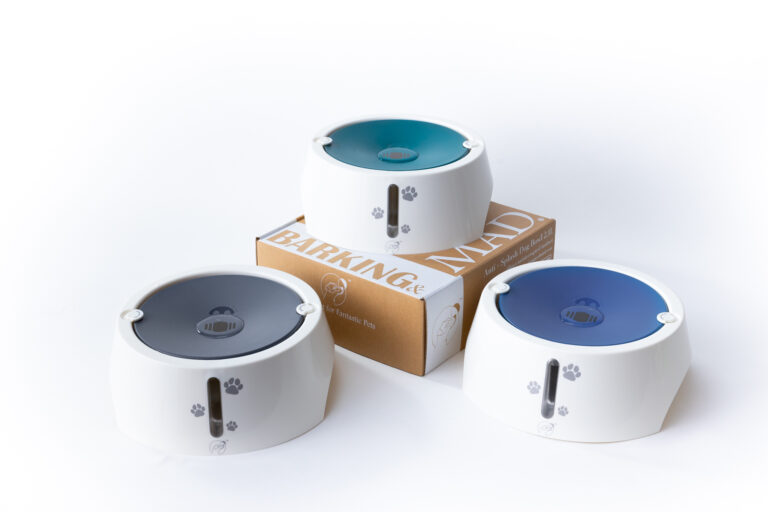How to Stop Your Dog Chewing His Bed
I wrote this blog after I walked in the room to find Snippet’s new bed in shreds. It’s a common and frustrating problem for many pet owners. Don’t worry, you’re not alone and there are ways to fix this. Let’s get into why dogs chew their beds and how to stop it.
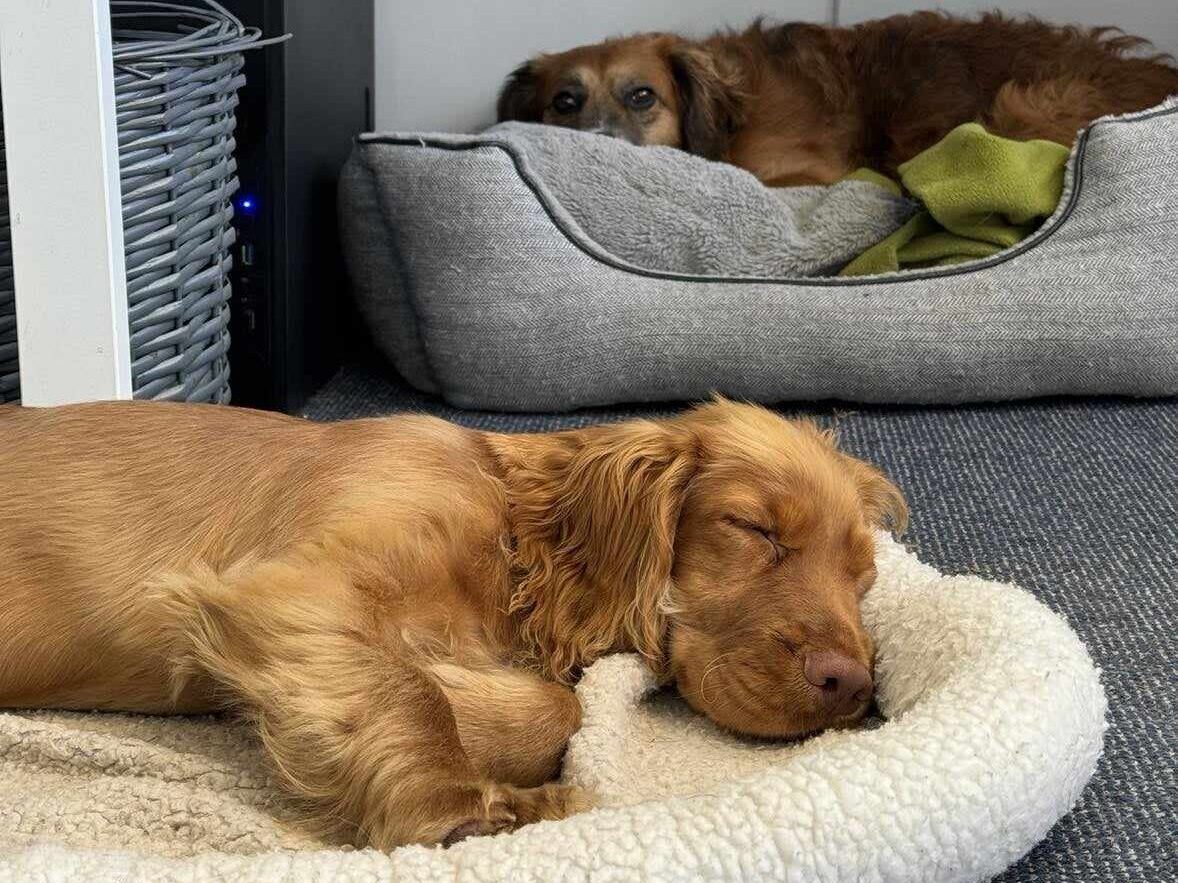
The Destruction Dilemma
Imagine this: You’ve just bought a brand new bed for your pets and you’re thinking you’ve given them the ultimate comfort. You get home from a long day and walk into the room to find your excited pup has shredded the bed. Sounds familiar?
This destruction can drive a dog owner crazy! But there’s hope! By understanding why your dog is chewing and implementing some simple solutions you can save their bed and your sanity.
The Chewing Behaviour
Why They Chew
Dogs chew for many reasons. It’s natural and instinctive. But when it comes to their own bed, dog’s behaviour can be a bit more complicated. Here are the common symptom of why dogs chew their beds:
Just like human babies, pups go through teething and chew to relieve discomfort. Providing chew toys can help manage this natural behaviour.
Dogs with excess energy and not enough mental and physical stimulation will chew to pass the time.
Dogs sometimes show chewing behavior as a coping mechanism for stress, often caused by separation from their owners or loud noises.
Sometimes dogs will chew on inappropriate items because they’re hungry or missing key nutrients in their diet.
Underlying health issues like gastrointestinal problems can also cause increased chewing.
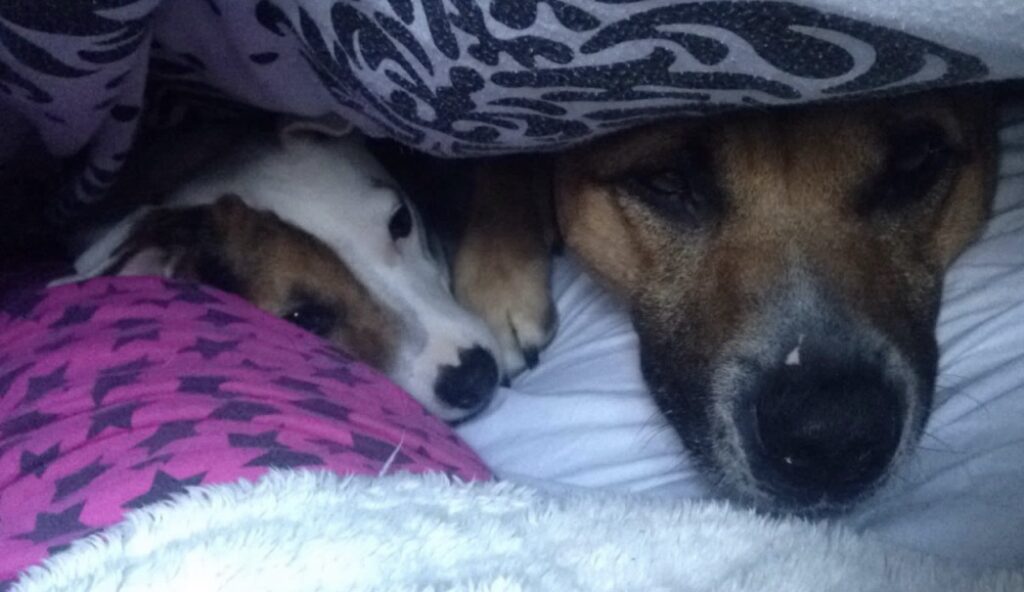
Boredom and Lack of Stimulation
One of the most common reasons for destructive behaviors is boredom. Simple solution are dogs need mental and physical stimulation to be happy.
Mental Stimulation
Engaging your dog’s mind is just as important as physical exercise. Puzzle toys, training sessions and interactive dog toys that dispense treats will keep their brains busy. Regular training sessions will not only provide stimulation but also strengthen the bond between you and your dog.
Exercise and interactive play
Without enough exercise and interactive play for long periods they can get restless and chew their beds as a form of entertainment.
Physical Stimulation
A dog with excess energy will chew on inappropriate items. Make sure your dog gets regular exercise suited to their breed and energy level. For high energy breeds this might mean long walks, runs or even agility training.
Anxiety and Stress
This can be a reaction caused by separation anxiety, loud noises or changes in their environment. Identifying the root of your dog’s stress is key to fixing this behaviour.
Separation Anxiety: If your dog chews their bed when you’re not home they might be experiencing separation. Start by gradually desensitising your dogs to your absence.
Leave for short periods and gradually increase the time you’re away. Providing comfort items such as a piece of clothing with your scent can also help calm your dog.
Noise Sensitivity
Loud outside noises like thunderstorms or fireworks can stress dogs and cause them to chew as a coping mechanism. Create a safe quiet space for your dogs during these events. Consider using white noise machines or calming music to block out the scary sounds.

Hunger and Nutritional Deficiencies
Ive noticed in some cases dogs will chew their beds because they’re hungry or missing key nutrients in their diet. Make sure your dogs on a balanced diet that meets their nutritional needs.
Sometimes adding a bit of variety to their meals or using food puzzles can make mealtime more fun and satisfying.
How to Stop Chewing & Dogs Chew Toys.
Now that we know why dogs sometimes chew their beds let’s look at some practical solutions to fix this.
Provide Appropriate Chew Toys
Giving your dogs appropriate chew toys will redirect their chewing away from their bed. Toys like indestructible dog chews and interactive dog toys will keep them busy and satisfy their need to chew.
Chew Toys: Choose durable and safe chews. Brands like Kong and Nylabone are good options. Make sure the toys are suitable for your dog’s size and chewing strength.
Interactive Dog Toys: that dispense treats or require problem solving will engage your dog’s mind and keep them busy for longer. These are great for dogs that need stimulation to prevent boredom.
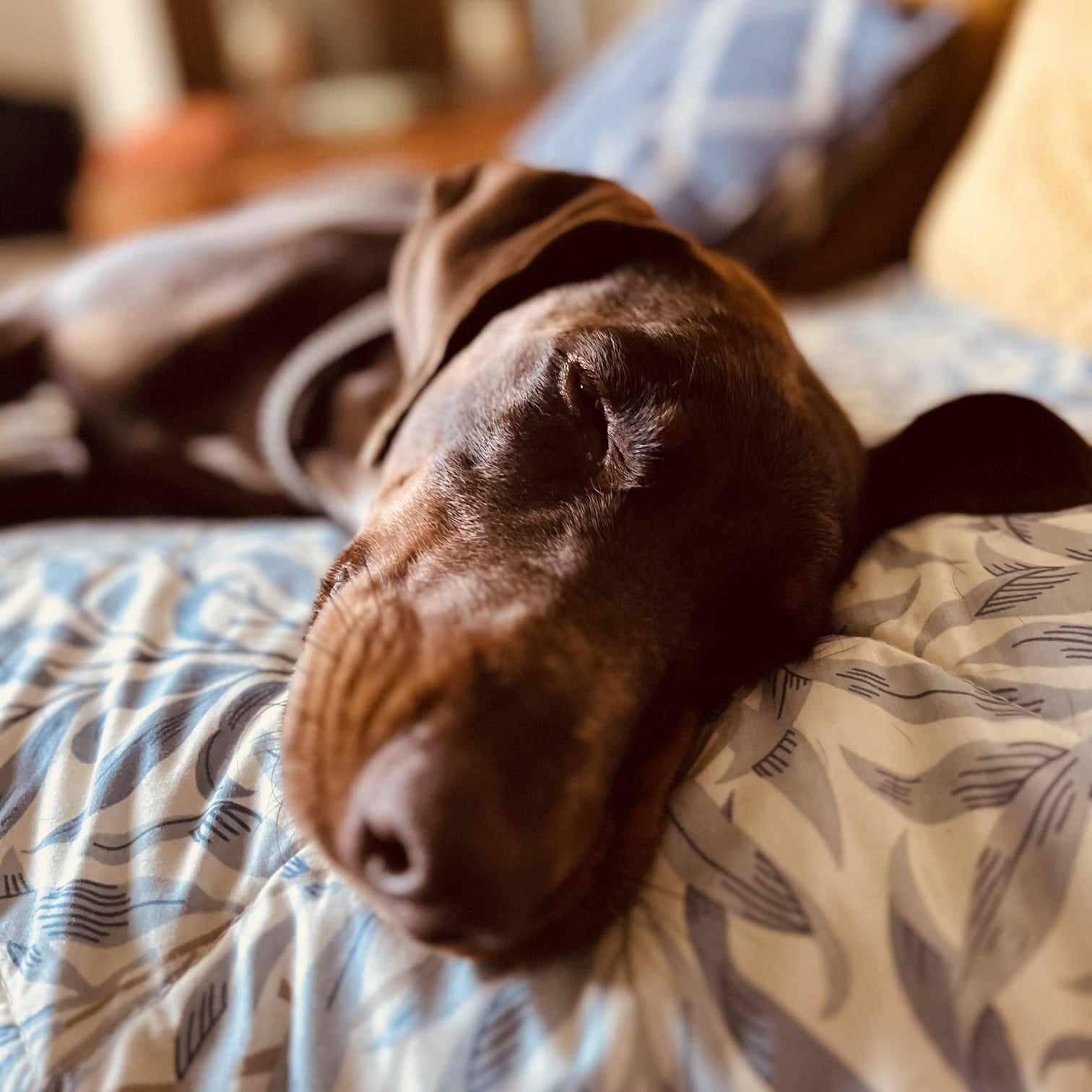
Exercise and Mental Stimulation
A tired dog is a good dog. Exercise and stimulation will reduce destructive behaviour.
Daily Walks and Play: Make sure your dog gets enough physical activity. A tired pup won’t chew. Exercise is essential to burn off energy.
Training Sessions: Engage your dog’s brain with training exercises. This is a great way to bond and tire them out mentally. Training will also set new boundaries and stop destructive behaviour.
Mental Stimulation
Puzzle Toys: Puzzle toys challenge your dog’s problem solving skills and keep them busy. These come in various difficulty levels so you can start with simple puzzles and increase the complexity as your dog gets better at solving them.
Training Commands and Tricks: Teaching your dog new commands and tricks is great stimulation. Start with basic commands like sit, stay and come and then move on to more complex tricks. This will keep their mind active and improve your communication with your dog.
Interactive Play
Games like hide and seek where you hide treats or toys and let your dog find them are very engaging. Another fun game is teaching your dog the names of their toys and asking them to fetch specific ones.
Below is a link to another Blog i wrote that has gained a lot of interest!
Create a Safe Space – Dog beds
Make your dog’s bed a haven. Make sure it’s comfortable and in a quiet area away from noise and distractions.
Comfortable Bedding: Choose a chew proof bed or a bed made from durable materials. This will withstand their chewing and be comfortable. Some owners opt for indestructible dog beds to prevent destruction.
Safe Space: Place the bed in a safe quiet corner where your dog feels safe. This will reduce anxiety driven chewing. Consider the placement of the bed to avoid outside noise that might stress your dog.
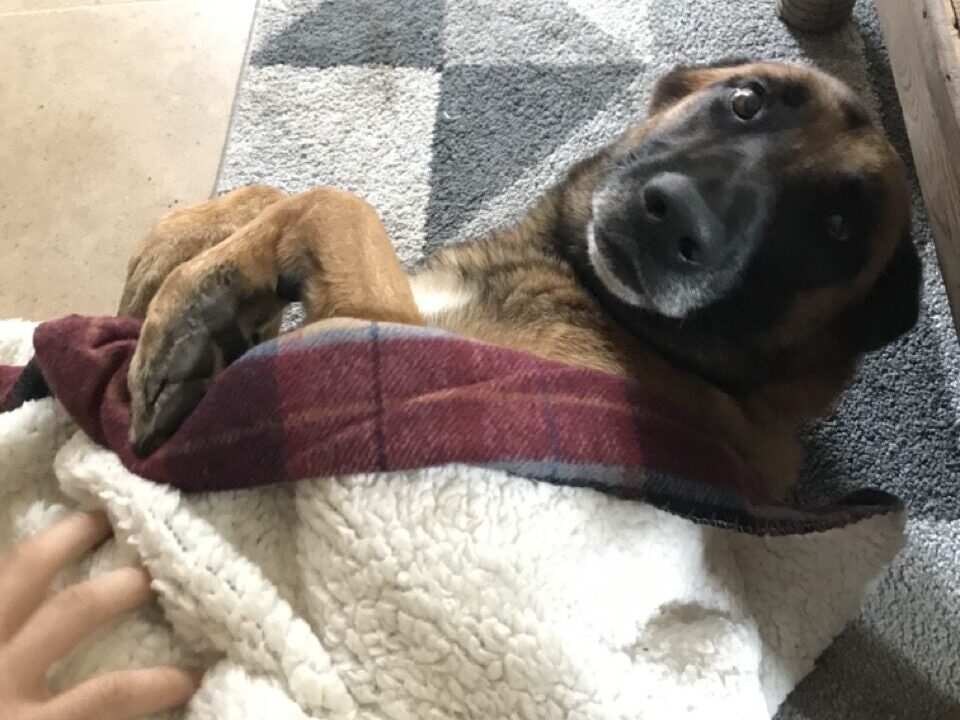
Advanced Tips to Create a Safe Space
Comfort Items: Add comfort items to your dog’s bed like their favourite blanket or a piece of your clothing. These will make their bed more appealing. These items have your scent on them which will help reduce stress.
Crate Training: If your dog feels safe in a crate consider using one as their safe space. Make sure the crate is big enough for them to stand, turn around and lie down comfortably. Covering the crate with a blanket will create a den like environment that many dogs find comforting.
Calming Aids: There are many calming aids available such as pheromone diffusers, calming collars and anxiety wraps. These will help create a more relaxing environment for your dog.
Separation Anxiety
If your dogs chewing is driven by separation anxiety you need to address this underlying issue.
Gradual Desensitisation: Get your dog used to being alone for short periods and gradually increase the time. This will make them feel more comfortable and less anxious when you’re not around.
Comfort Items: Leave an item with your scent like an old t-shirt in their bed so they have comfort when you’re away. This will help calm their anxiety.
Handling Separation Anxiety Deep Dive
Dealing with separation anxiety in dogs can be tough, but with patience and consistency, you can help your dog feel more at ease. Start by creating a calming pre-departure routine.
Give your dog a special treat or toy reserved only for when you’re away. Gradually increase the time you’re out, starting with a few minutes and slowly extending it.
Consistency is crucial as it helps your dog learn that you always return.
Another effective strategy that helped us
keep your goodbyes brief and low-key. Long, emotional farewells can heighten your dog’s anxiety, so keep departures calm and quick.
1. Exercise is also key; a tired dog is generally less anxious. A brisk walk or an energetic play session before you leave can work wonders. By incorporating these steps into your routine, you can ease your dog’s separation anxiety and make your time apart less stressful for both of you.
2. Routine Establishment: Establish a routine for leaving and coming home. Dogs feel more secure when they know what to expect. Don’t make a big fuss when you leave or come home to reduce anxiety.
3. Interactive Feeders: Use interactive feeders that dispense food gradually. This will keep your dog occupied for longer and distract them from your absence.
4. Professional Help: In extreme cases of anxiety, consult a professional dog trainer or vet. They can provide custom training and techniques to help your dog cope.

Checklist: Your Dog’s Needs Met
Use this checklist to make sure your dog has everything they need to not chew their bed:
Appropriate Chew Toys: Durable and safe ones that suit your dog’s size and chewing strength.
Regular Exercise: Daily walks, playtime and mental challenges.
Comfortable Bed: A chew proof or indestructible dog bed in a quiet safe corner.
Separation Anxiety Solutions: Gradual desensitization and comfort items with your scent.
Top Tips to Stop Dog Bed Chewing
Identify the Cause: Understanding why your dog chews their bed is the first step to solving the problem. Whether it’s boredom, anxiety or teething, identifying the root cause will help you choose the right solution.
Choose the Right Bed: Get a biting proof dog bed or one made of durable materials. These beds are designed to withstand your dog’s chewing and scratching. Look for beds with reinforced seams and heavy duty fabrics.
Provide Plenty of Chew Toys: Redirect your dog’s chewing to the right items. Make sure they have a variety of chew toys available at all times. Rotate the toys regularly to keep your dog interested.
Other Useful Tips
Increase Physical Exercise: An exercised dog is less likely to chew due to boredom. Make sure your dog gets enough physical activity based on their breed and energy level. Long walk sessions and runs will help burn off excess energy.
Stimulation: Engage your dog’s brain with puzzles, training sessions and interactive play. A mentally stimulated dog is less likely to resort to destructive behaviour.
Safe and Comfortable Space: Make sure your dog’s bed is in a quiet, safe area of the house. This will reduce stress and anxiety which are common causes of chewing. Adding familiar items with your scent will also provide comfort.
Anxiety Issues
If your dog’s chewing is due to anxiety, work on gradual desensitization. Leave them alone for short periods and gradually increase the time. Provide comfort items and use calming aids.
Deterrents: Commercial deterrent sprays can make the bed less appealing to chew. These sprays have a bitter taste that will deter chewing without harming your dog.
Train and Reward Good Behaviour: Positive reinforcement works wonders. Reward your dog for chewing on the right items and gently redirect them if they start chewing their bed. Consistency is key to reinforcing good behaviour.
Get Professional Help if Needed: If your dog’s chewing persists after trying these tips, consult a professional dog trainer or behaviourist. They can provide customised solutions and advice for your dog’s specific needs.

You Made It To The FAQ!
Why does my dog take his treats to his bed?
Your dog takes treats to his bed because it’s a safe and comfortable space. The bed is his personal space where he feels secure so it’s the perfect place to enjoy a treat.
Why does my dog chew his bed at night?
Your dogs will chew at night due to boredom, anxiety or teething (in puppies). Make sure they have enough mental and physical stimulation during the day and it will reduce night time chewing.
How to stop a dog from chewing a bed in a crate?
To stop a dog from chewing a bed in a crate, provide chew toys, ensure they get enough exercise and address any anxiety. A chew proof dog bed can also help.
Why does my dog chew my mattress?
Your dogs will chew mattresses due to boredom, anxiety or teething. Make sure they have their own comfortable bed and provide chew toys.
Is it normal for puppies to chew their bed?
Yes it’s normal for puppies to chew their bed during teething. Providing chew toys will help with the discomfort and redirect the chewing behaviour.
The End part
In summary, How to stop dog chewing his bed is all about understanding the underlying reason and addressing it with the right solution. Whether it’s providing chew toys, regular exercise or a safe and comfortable space, these will help with destructive chewing.
Remember, patience and consistency is key. With the right approach you can save your dog’s bed and your sanity and keep your furry friend happy and healthy.
By implementing these strategies, you can effectively stop your dog from chewing his bed and enjoy those relaxing moments of peace. Happy pet parenting!

